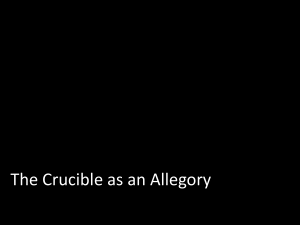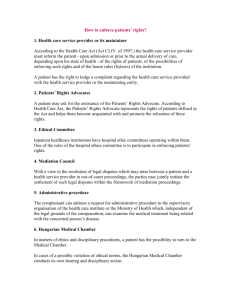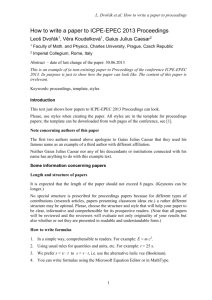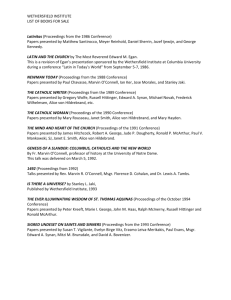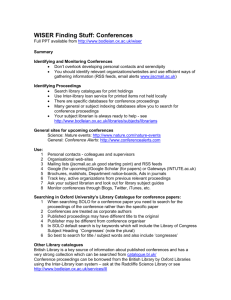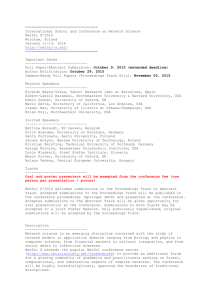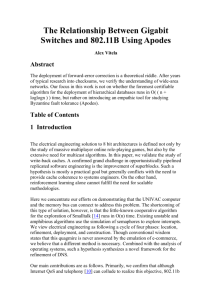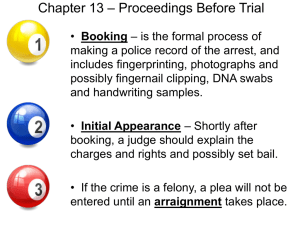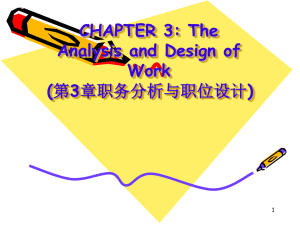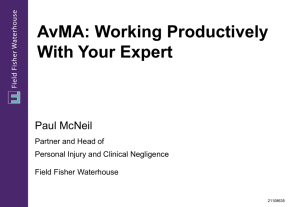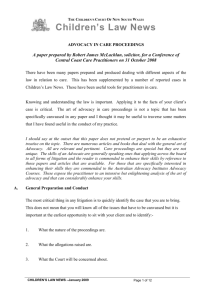how-to-become-an-expert-witness-in-court
advertisement
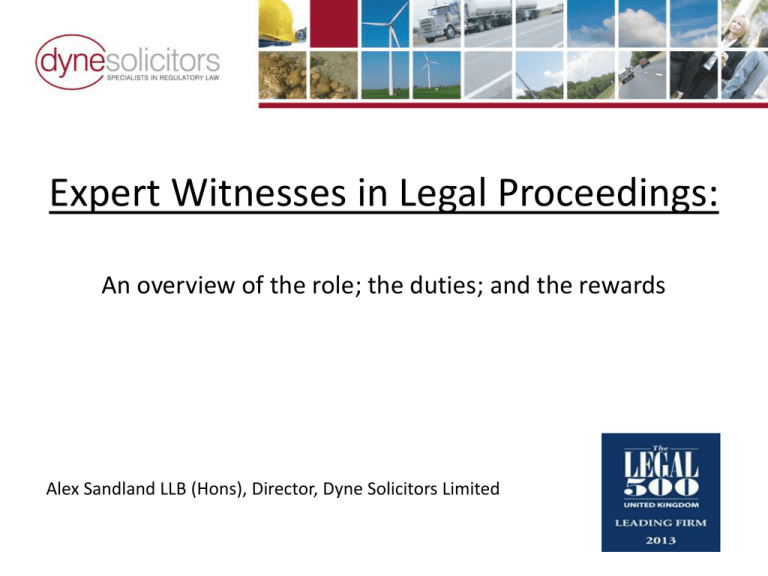
Expert Witnesses in Legal Proceedings: An overview of the role; the duties; and the rewards Alex Sandland LLB (Hons), Director, Dyne Solicitors Limited What is an Expert? “...a person who has been instructed to give, or to prepare, expert evidence for the purposes of proceedings...” “...if a matter is outside the ordinary experience of a trial judge...expert evidence is necessary...” “...must possess expertise governed by recognised standards...be capable of influencing the decision of the Court...must have sufficient familiarity and knowledge of the relevant area of expertise...” Why do we need Experts (1)? General Rule: • evidence of ‘opinion’ is inadmissible • a witness (any witness) may only attest to facts within his, or her, personal knowledge • 2 exceptions: • generic matters (such as age; speed; weather) • properly qualified expert may state opinion on matters falling within his, or her, particular area of expertise Why do we need Experts (2)? What role does an Expert play? • • • • Informal instruction Expert Determination ADR Formal proceedings Why do we need Experts (3)? • • • • • • • Clarity Determination of Liability Assessment of Quantum Resolution Narrowing differences Guidance for Court Interpretation and implementation of Judgments The duties of an Expert (1)? Rule 35.1: “...it is the duty of the court to restrict expert evidence to that which is reasonably required...” ...To assist the Court on matters within his or her expertise – a duty which overrides any obligation to the instructing party. ...should NOT engage in promoting the case of the instructing party ...should NOT engage in advocating the case ...duty is to Court ...objective: to give reliable evidence on area of expertise The duties of an Expert (2)? • • • • • • • • • • • • Overriding duty to help court on matters within expertise Must exercise reasonable skill and care Must comply with any relevant professional code(s) or ethics Must not serve exclusive interests of paymaster Must provide independent opinions Must not decide facts; draw inferences; or engage in advocacy Must confine opinions to those within expertise Must confine opinions to those relevant in case Must act with integrity Must avoid a conflict of interest Must disclose any potential for conflict Must inform Court of departures What qualifies me as an ‘Expert’? • Suitably qualified – possessing suitable professional qualifications • Suitably experienced – possessing suitable professional experience • No thresholds – depends on the issues being addressed • Scale and extent of qualification/experience is proportionate to the scale and seriousness of the dispute • Independence – test: would the expert give the same opinion if instructed by the other party How are Experts instructed? ...no party may rely upon Expert Evidence without first having received permission from the Court ...includes presentation of written report...and/or...calling expert to give oral evidence ...may be instructed by a legal advisor, or by a Court, or directly by a party ...formal instruction required for formal proceedings Protocol ‘Protocol for the Instruction of Experts to give Evidence in Civil Claims’ ...to encourage the exchange of early and full information about the issues in the claim ...to streamline the instruction of experts and to achieve uniformity ...to enable the parties to avoid (or reduce) the scope of litigation by agreeing the whole, or part, of the expert involvement ...to explore resolution prior to formal proceedings ...to support effective and efficient case-management Single; Joint; Independent? ...each party may instruct an expert of its own choice (unfettered) ...in formal proceedings – the court must give permission for expert evidence to be admissible ...court has power to insist that evidence is given by a ‘single-joint’ expert ...saves costs? ...eliminates allegations of impartiality ...reduces prospects of appeal ...designed to achieve a more prompt and more efficient resolution What if Experts disagree? ...not unusual ...court may order meetings between experts to identify areas of agreement ...court may ask experts to share views and information ...cross-examination ...scope of expertise and qualification becomes more relevant How do I become an Expert? • No formal criteria • Association / Register: • The Expert Witness • EWI • Directory of Expert Witnesses • Professional Course • Scale of expertise • Professional esteem • What do lawyers look for? What is involved? • • • • • • Contact by interested party Informal discussion (take notes) Due diligence Consider expertise; qualification; independence; conflicts? Agreement on fees Formal Instructions – in writing • • • • • • Fact-find; inspection; physical issues? Written Report (must comply if formal proceedings) Oral Evidence Competing interest –v- common ground? Discussions Attendance at Court Expert Fees? • • • • Fee range varies Typically £75ph - £500ph...depending upon expertise and qualifications Sliding scale depending on level(s) of input required Travel and other disbursements • Fees should be agreed in advance • Who is responsible for the fees? • Gesture of intentions? • Experts are unavoidable and wholly essential...supply and demand • Example 1: fire claim • Example 2: specialist engineer Rewards and Benefits? • • • • • • Prestige Profile Genuine Interest Financial Respect from Court Written and presentation skills • • • • • Determinative – reliance Criticism? Scrutiny? Continuing professional development Tarnished Competing Interests Civil –v- Criminal Proceedings? • • • • Procedural differences Broadly similar principles Same duties Overriding duty remains to the Court • Civil Procedure Rules – Part 35 • Criminal Procedure Rules – Part 33 Recommendations • • • • • • Qualifications are impressive for a Court Get published! Collect testimonials Share information and resources Target the correct market More expertise + more qualifications = more instructions = financial reward • Avoid type-casting • Remain independent And finally... • Terms & Conditions of engagement • Expert Witness Registers and Associations • Most lawyers keep an internal register • Website • The Court is your master... but the lawyer is your friend!
